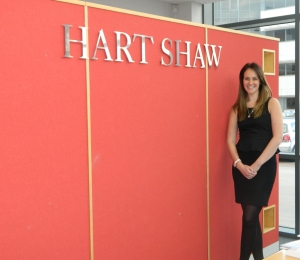Hart Shaw Chartered Accountants & Business Advisers is delighted to announce Natalie Bracey as a new Associate within the Sheffield based firm.
The role is designed to support the ongoing succession of the firm and the appointment of Natalie as Associate is likely to lead to Partnership in the future.
Having started at Hart Shaw in 2004, Natalie has over 10 years’ experience advising clients of various sizes covering a wide range of industries. Natalie spent the last 3 years managing in the Business Services Department, focussing on delivering strategic direction and client care.
Natalie comments about her appointment: “During my time at Hart Shaw I have seen the firm grow and undertake various significant developments, however, one thing has remained constant throughout and that is the firm’s dedication to providing the best client service; working with our clients to help them achieve their business and personal goals.
“I am so proud to be part of such a hardworking and motivated team and would like to take this opportunity to thank the partners, staff and clients of the firm, past and present, without whom I would not be in this position today.”
Managing Partner, Martin McDonagh adds: “The Partners of Hart Shaw are pleased to announce that Natalie Bracey has been promoted to the role of Associate as of April 1st 2015 and in addition to her existing client base she will take on responsibility for a portfolio of clients.
“Natalie will also be responsible for bringing fees into the firm, enhancing the reputation of Hart Shaw and driving the business forward in line with our corporate objectives.
“Natalie’s appointment illustrates our desire to promote and invest in our staff members and, that with the right attitude and work ethic, this opportunity is available to all.”
Natalie comments about the future at Hart Shaw: “One of the main reasons why I enjoy being a part of Hart Shaw is that we offer a wide range of expertise and specialisms to enable us to service all of our client’s needs, but tailor this service specifically to treat each one of our clients as individuals.
“Along with increasing Hart Shaw’s capacity, I plan to strengthen our service offering to businesses in the region and further develop the firm’s commitment to delivering a quality service to clients, whilst progressing the business and our skilled team.
“I will support and build on Hart Shaw’s continuous plans for growth by bringing enthusiasm and providing fresh ideas and a new perspective to the team.”
Read the latest news from Hart Shaw


